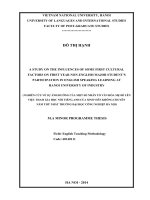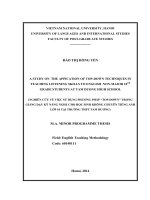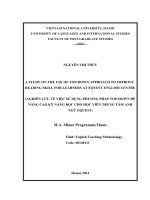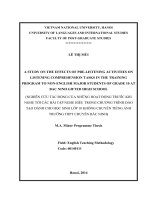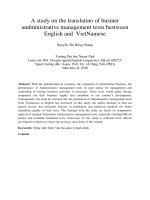A study on the reality of using english communication skills of the juniors of faculty of english at thuongmai university
Bạn đang xem bản rút gọn của tài liệu. Xem và tải ngay bản đầy đủ của tài liệu tại đây (392.88 KB, 46 trang )
THUONGMAI UNIVERSITY
ENGLISH FACULTY
------
GRADUATION PAPER
TOPIC:
HANOI - 2020
ABSTRACT
Currently, the trend of globalization and internationalization in all fields is
taking place strongly in almost all countries in the world, including Vietnam.
Therefore, to facilitate the international integration in a convenient and
comprehensive manner, besides the political, economic or cultural factors, the
proficiency in using foreign languages in general and English in particular is
extremely necessary for all social classes, especially for young people and
university students.
The English proficiency mentioned here is not only limited to the knowledge
that the students are studying at the university, but also how they use that foreign
language in communication. Currently, communicating well in English is
considered as an important factor that helps students have better opportunities to get
a good job and to have a good status in society.
However, in order to communicate well in English, students will certainly
encounter many difficulties and obstacles, especially for students in a non-native
English speaking country like Vietnam.
Therefore, this study is based on the research on the situation of using English
communication of English-majored third year students at Thuongmai University.
All the data and information gathered from them can help researchers find out the
difficulties and obstacles that they are really facing in the process of learning to
communicate in English. From the results of that situation analysis, some most
feasible suggested solutions will be brought out to help them overcome all barriers
and become proficient in using English communication skills.
ACKNOWLEDGEMENT
First of all, I would like to express my gratitude to my instructor, Ms. Hoang
Thi Thuy, MA of English Faculty of Thuongmai University, for her enthusiastic
guidance, very helpful comments and detailed corrections throughout my research.
Moreover, I would like to thank all the lecturers in the Faculty of English at
Thuongmai University. They are the ones who have brought me a lot of new
1
knowledge, including professional knowledge and knowledge about life during my
four-year studying process. Not only that, they also helped me a lot in improving
my soft skills, especially my communication and presentation skills in English.
In particular, I am very grateful to my family. My family has been a source of
support, both physical and mental ones, for me during my four years of college.
Their sincere and precious encouragement is immeasurable and I really appreciate
it.
Also, I couldn't help but say thanks to my close friends and classmates, who
have been studying with me all this time. They have exchanged knowledge with me,
studied with me and got progress with me. They have also helped me a lot so that I
could smoothly pass all the modules during 4 years of study.
Finally, I would like to say thank you to all the students who participated in
the questionnaire survey and interview on the topic "The reality in using English
communication skills of students ". Thanks to their enthusiastic help, everything
could go smoothly and I was able to complete my study.
Hanoi, 24th April, 2020
Student
Nguyen Dang Ngoc Anh
TABLE OF CONTENS
ABSTRACT..............................................................................................................i
ACKNOWLEDGEMENT......................................................................................ii
TABLE OF CONTENS..........................................................................................iii
LITS OF TABLES AND CHARTS.........................................................................v
CHAPTER 1: OVERVIEW OF THE STUDY......................................................1
1.1. Rationale............................................................................................................1
1.2. Previous studies.................................................................................................1
1.3. Aims of the study...............................................................................................2
1.4. Research subject................................................................................................2
1.5. Research methodology......................................................................................3
1.6. Scope of the study..............................................................................................3
2
1.7. Organization of the study.................................................................................3
CHAPTER 2: LITERATURE REVIEW...............................................................5
2.1. Some basic definitions......................................................................................5
2.1.1. Skill.................................................................................................................5
2.1.2. Communication..............................................................................................5
2.1.3. Communication skill.......................................................................................8
2.2. Importance of communication skills...............................................................8
2.2.1. To communicate in work and daily life..........................................................8
2.2.2. To communicate in studying process..............................................................9
2.3. Importance of communicating in English.......................................................9
2.3.1. In study............................................................................................................ 9
2.3.2. In work..........................................................................................................10
2.3.3. In daily life....................................................................................................11
2.4. Techniques to communicate well...................................................................11
2.4.1. Maintain good body language......................................................................11
2.4.2. Seek first to understand................................................................................13
2.4.3. Be open and honest.......................................................................................13
2.4.4. Frame your views..........................................................................................14
2.4.5. Meet others where they stand.......................................................................15
2.5. Factors affecting students' ability to use English communication skills.....16
2.5.1. Students' perceptions of the importance of English communication skills.16
2.4.2. Psychological factors....................................................................................17
2.4.3. Communication environment.......................................................................17
2.4.4. Influence of mother tongue..........................................................................18
CHAPTER 3: RESEARCH FINDINGS..............................................................19
3.1. Students’ self-assessment on their level of English communication skills.. 19
3.2. Places where students often use English to communicate............................21
3.3. Students’ self-confident level when communicating with foreigners..........21
3.4. Factors that students focus on when communicating in English................22
3.5. Students’ difficulties when communicating in English................................23
3.5.1. Think in Vietnamese while communicating in English..............................24
3.5.2. Restriction on vocabulary.............................................................................25
3.5.3. Lack of concentration when communicating in English............................26
3
3.5.4. Lack of self-confidence when communicating in English...........................26
CHAPTER 4: SOME SUGGESTED RECOMMENDATIONS.........................29
4.1. Some suggested recommendations for the third year English-majored
students................................................................................................................... 29
4.1.1. Being self-confident......................................................................................29
4.1.2. Try to practice more and promote self-study................................................30
4.1.3. Stop thinking in Vietnamese when communicating in English...................31
4.1.4. Try to read more and practice by writing.....................................................31
4.2. Some suggested recommendations for the lecturers of the Faculty of
English at Thuongmai University.........................................................................31
4.2.1. Create a favorable environment for students to communicate in English
right in the classrooms...........................................................................................32
4.2.2. Change teaching methods............................................................................32
4.3. Some suggested recommendations for Thuongmai University’s Board of
management...........................................................................................................33
4.3.1. Find and supplement qualified English native lecturers.............................33
4.3.3. Improve the quality of English faculty lecturers..........................................34
4.3.4. Improve the quality of facilities for the learning process............................35
CONCLUSION......................................................................................................36
REFERENCES.......................................................................................................vi
LITS OF TABLES AND CHARTS
No. Tables and Charts
Page
Chart 3.1: Self-assessment of third-year English-majored students
1
at Thuongmai University on their level of English communication
19
skills.
Chart 3.2: The self-confidence level of a third-year English2
3
4
majored students at Thuongmai University when communicating
with foreigners.
Chart 3.3: Factors that students focus on when communicating in
English.
Chart 3.4: Obstacles that third-year English-majored students at
Thuongmai University when using English communication skills.
4
21
22
23
Table 1: The self-confidence level of third-year English-majored
5
6
students at Thuongmai University when communicating with
foreigners.
Table 2: Places where third-year English-majored students at
Thuongmai University often use English to communicate.
5
20
21
CHAPTER 1
OVERVIEW OF THE STUDY
1.1.
Rationale
Nowadays, when English has become a global language, learning English is
extremely important to everyone, especially to students who want to get a good job
in the future. However, currently almost students at universities, including Englishmajored ones, seem to be only learning specialized English.
Indeed, to be able to live and work in a globalized working environment, only
specialized English knowledge is not enough. Students need to communicate well in
English to turn it into a useful tool to support them in the process of working as
well.
For these reasons, “A study on the reality of using English communication
skills of the juniors of Faculty of English at Thuongmai University” was
conducted to identify the reality in using English communication skills of students
and propose some suggested solutions to help them improve their English
communication skills.
1.2.
Previous studies.
There have been many research studies carried out relating to the using of
communication skills in general and English communication skills in particular in
the world and also in Vietnam. Some noticeable ones are described as follows:
Firstly, the research “English Communication Skills: How Are They Taught at
Schools and Universities in Oman?” done by Rahma Al-Mahrooqi, was published
on April 1st, 2012. This research focuses on how Omani students define the English
communication skills and how they are taught to communicate in English at
schools, universities and other educational institutions. According to the result of
this research, the author shows that none of students define wrongly about the
English communication skills, but all of their definitions are in a very limited sense.
Students learn English communication skills not only at schools, but also by
personal interaction with many groups of people in society, including family
members, friends, teachers (inside and outside the classroom), private institutes, and
English clubs.
1
Secondly, the research “The importance of English communication skills in
multilingual settings in Southern Africa” done by Ingrid Fandrych, was published
on the website “English Today” of Cambridge University Press (CUP) on
September 2009. This research aims to find out and emphasize the importance of
appreciating language communication skills in general and English communication
skills in particular in a developing multilingual context. According to the author,
there is a need to act, especially in the developing world, to ensure that English
communication as a basic skill is available to the majority of population.
Finally, the research “Kỹ năng giao tiếp tiếng Anh trường Đại học Cảnh sát
nhân dân trong thời kỳ hội nhập” done by Le Huong Hoa, was published on May
2018. This study aims to understand the limitations of students when using English
communication skills so that they can find out the solutions to further improve
English communication skills for students to meet needs in studying and
participating in international cooperation. According to the author, in fact, most
students have quite a long time to learn English, but their ability to use English in
their studies as well as in professional work after graduation is not really effective.
Students are not confident enough when communicating in English.
1.3.
Aims of the study.
Nobody can deny the importance of English in today globalizing and
developing world. Learner who communicate well in English seem to have an
advantage over the others, they will have much better opportunities in studying,
working and many other aspects in life. Therefore, this study aims at investigating
the reality in using English communication skills of the Juniors of English Faculty
at Thuongmai University. Simultaneously, it is essential to find out the difficulties
and obstacles that they have when communicating in English. And then, from these
difficulties, some suggested recommendations should be brought out to help them
improve their English communication skills.
1.4.
Research subject.
This study is designed to reveal the ability in using English communication
skills of students in studying and in work and daily life. Specifically, it also shows
both students’ strengths and weaknesses when they communicate in English, what
2
difficulties and obstacles they have. Then, some recommendations will be brought
out to help them in English communicating improvement process.
1.5.
Research methodology.
This study is carried out based on the combination between qualitative
research methods and questionnaire survey, including observation. Through the
results of these research methods, the reality in using English communication skills
of the Juniors of English Faculty at Thuongmai University can be found out.
After analyzing the information and data collected, the difficulties and
obstacles which prevent these students from communicating English well will be
discovered.
In this study, the following questions will be investigated:
- What is the current situation of using English communication skills of
students today?
- What causes obstacles for students when communicating in English?
- How can they overcome those obstacles to communicate well in English?
1.6.
Scope of the study.
This study focuses on researching and analyzing the reality of using English
communication skills of third year English-majored students at the Thuongmai
University by using data collected through survey questionnaire and direct
observation. The questionnaire is designed with 10 multiple choice questions,
relating to several aspects in learning and practicing English communication skills
of students and it was sent to a hundred juniors of English Faculty at Thuongmai
University to collect data and information from their learning and practicing
process. The results of this study may be limited to students participated in the
research and information finding process. However, it can be used as a resource for
students who are interested in practicing and improving their English
communication skills.
1.7.
Organization of the study.
4 main parts will be included in this study:
3
- Chapter 1: Overview of the study. This chapter consists of The Rationale,
Previous studies, Aims of the study, Research subject, Research Methodology,
Scope of the study and Organization of the study.
- Chapter 2: Literature review. This chapter consists of Some basic
definitions, Importance of communication skills, Factors affecting students’ ability
in using English communication skills.
- Chapter 3: Research findings and Analysis. This chapter consists of the
data, information collected from the questionnaire survey, observation and
interview. These data and information will be analyzed in detail in this chapter.
- Chapter 4: Suggested recommendations. This chapter consists of some
useful suggested solutions which are brought out to help students communicate well
in English.
CHAPTER 2
LITERATURE REVIEW
2.1. Some basic definitions.
2.1.1. Skill.
A skill is the ability to carry out a task with determined results often within a
given amount of time, energy, or both. Skills can often be divided into domaingeneral and domain-specific skills. For example, in the domain of work, some
general skills would include time management, teamwork and leadership, selfmotivation and others, whereas domain-specific skills would be used only for a
certain job. Skill usually requires certain environmental stimuli and situations to
assess the level of skill being shown and used. In fact, there are many kinds of skills
such as:
4
- Hard skills (also called technical skills): Any skills relating to a specific
task or situation.
- Life skills: An ability and capacity acquired through deliberate, systematic,
and sustained effort to smoothly and adaptively carryout complex activities or job
functions involving ideas (cognitive skills), things (technical skills), and/or people
(interpersonal skills).
- Social skill: Any skill facilitating interaction and communication with
others. Social rules and relations are created, communicated, and changed in verbal
and nonverbal ways.
- Soft skills: A combination of interpersonal skills, social skills,
communication skills, character traits, attitudes, career attributes and emotional
intelligence quotient (EQ) among others.
In general, there are many skills that are useful and necessary in your day-today life. Depending on what stage of life you are in, these skills can differ from
person to person. There are certain skills that can help you conquer some common
challenges that can occur when you're learning to be independent and self-reliant.
2.1.2. Communication.
Communication (from Latin communicare, meaning "to share") is the act of
conveying meanings from one entity or group to another through the use of
mutually understood signs, symbols, and semiotic rules. Communication is thus a
process by which meaning is assigned and conveyed in an attempt to create shared
understanding. Gregory Bateson called it "the replication of tautologies in the
universe. This process, which requires a vast repertoire of skills in interpersonal
processing, listening, observing, speaking, questioning, analyzing, gestures, and
evaluating enables collaboration and cooperation.
The main steps inherent to all communication are as follows:
- The formation of communicative motivation or reason.
- Message composition (further internal or technical elaboration on what
exactly to express).
- Message encoding (for example, into digital data, written text, speech,
pictures, gestures and so on).
5
- Transmission of the encoded message as a sequence of signals using a
specific channel or medium.
- Noise sources such as natural forces and in some cases human activity (both
intentional and accidental) begin influencing the quality of signals propagating from
the sender to one or more receivers.
- Reception of signals and reassembling of the encoded message from a
sequence of received signals.
- Decoding of the reassembled encoded message.
- Interpretation and making sense of the presumed original message.
The scientific study of communication can be divided into:
- Information theory which studies the quantification, storage, and
communication of information in general;
- Communication studies which concerns human communication;
- Biosemiotics which examines communication in and between living
organisms in general.
Human communication is unique for its extensive use of abstract language.
Development of civilization has been closely linked with progress in
telecommunication.
There are three main types of communication: Verbal communication, Nonverbal communication and Written communication.
- Verbal communication is the spoken or written conveyance of a message.
Human language can be defined as a system of symbols (sometimes known
as lexemes) and the grammars (rules) by which the symbols are manipulated. The
word "language" also refers to common properties of languages. Language
learning normally occurs most intensively during human childhood. Most of the
large number of human languages use patterns of sound or gesture for symbols
which enable communication with others around them.
- Nonverbal communication describes the processes of conveying a type of
information in a form of non-linguistic representations. Examples of nonverbal
communication include haptic communication, chronemic communication, gestures,
body language, facial expressions, eye contact etc. Nonverbal communication
6
demonstrates one of Paul Watzlawick's laws: You cannot not communicate. Its cues
are heavily relied on to express communication and to interpret others'
communication and can replace or substitute verbal messages. Non-verbal
behaviors may form a universal language system." Smiling, crying, pointing,
caressing, and glaring are non-verbal behaviors that are used and understood by
people regardless of nationality. Such non-verbal signals allow the most basic form
of communication when verbal communication is not effective due to language
barriers.
- Written communication: The progression of written communication can be
divided into three "information communication revolutions":
Written communication first emerged through the use of pictographs. The
pictograms were made in stone, hence written communication was not yet mobile.
Pictograms began to develop standardized and simplified forms.
The next step occurred when writing began to appear on paper, papyrus,
clay, wax, and other media with commonly shared writing systems, leading to
adaptable alphabets. Communication became mobile.
The final stage is characterized by the transfer of information through
controlled waves of electromagnetic radiation (i.e., radio, microwave, infrared) and
other electronic signals.
2.1.3. Communication skill.
Communication skills are abilities you use when giving and receiving
different kinds of information. Some examples include communicating ideas,
feelings or what’s happening around you. Communication skills involve listening,
speaking, observing and empathizing. It is also helpful to understand the
differences in how to communicate through face-to-face interactions, phone
conversations and digital communications, like email and social media and so on.
There are different types of communication skills you can learn and practice
to help you become an effective communicator. Many of these skills work
together, making it important to practice communication skills in different
contexts whenever possible. Active listening is a typical example of
communication skills. It means paying close attention to the person who is
7
speaking to you. People who are active listeners are well-regarded by their coworkers because of the attention and respect they offer others. While it seems
simple, this is a skill that can be hard to develop and improve. You can be an
active listener by focusing on the speaker, avoiding distractions like cell phones,
laptops or other projects, and by preparing questions, comments or ideas to
thoughtfully respond. Another instance of a communication skill is respecting. A
key aspect of respect is knowing when to initiate communication and respond. In a
team or group setting, allowing others to speak without interruption is seen as a
necessary communication skill tied to respectfulness. Respectfully communicating
also means using your time with someone else wisely staying on topic, asking
clear questions and responding fully to any questions you’ve been asked.
2.2. Importance of communication skills.
2.2.1. To communicate in work and daily life.
Communication is a daily activity that happens continuously everywhere,
every aspect of everyday life. It is the connection between the speaker and the
listener. Therefore, communication is a very valuable skill to practice. The first
benefit of having good communication skill is that we will always be confident to
talk and share with people. Many people, who are not well equipped with ways to
communicate, are often afraid, especially when they meet other people for the first
time. This has made them lose the opportunity to have a good soul mate, a business
partner, a support counselor, even a career promotion.
In the workplace, if you have good communication skills, all relationships
with friends and colleagues will become closer. Promotion opportunities are also
more open to people with good communication skills. Besides, people who do
business always need a good communication skill to expand their customers
relationships and partnerships.
In the family, every individual also needs to equip themselves with a set of
communication skills. Children need communication skills to understand the
psychology of their grandparents and parents and to be able to communicate openly
and to easily share emotions with parents. At the same time, adults must also have
8
the communication skills to be able to listen to children, share the thoughts of the
younger generation.
2.2.2. To communicate in studying process.
Communication skills not only play an important role in work and daily life,
but it is also essential in the learning process. Communication skills are a tool for
you to express your own views and opinions during the lessons, it helps you discuss
with your teacher and classmates about a problem related to the lesson. Good
communication skills will help those around you to understand what you are trying
to convey to them, so that your views and thoughts will be heard, captured and
discussed. It's a great way for you to study and exchange knowledge with your
teachers and friends.
2.3. Importance of communicating in English.
2.3.1. In study.
In this integration stage, the society’s demand for human resources who are
high-qualified and proficient in foreign language is increasing. Therefore,
universities are also gradually promoting the teaching and learning in English. This
requires students not only to have good English listening, speaking, reading, and
writing skills to grasp the content of the lesson, but they also need to equip
themselves with good English communication skills to be able to express their
views and opinions during the learning process as well as exchange ideas with
teachers and classmates.
Moreover, young people always want to learn many things. Learning
encapsulated within national borders with the younger generation is still not
enough. That is why more and more friends for studying abroad to continue to
expand their knowledge. It can be said that English is the key for you to open the
door to study abroad. And one thing that you often confuse is that academic English
and communicative English are the same. However, the truth is that it has a big
difference and also plays different roles for the process of studying abroad. If
academic English helps you to absorb lectures and conduct research, learning
communicative English will help you easily integrate into your new country and
9
new environment. Good integration is the first step to help international students
feel confident, have more opportunities to develop themselves later.
In a new country, language is the biggest barrier that international students
often face. Therefore, you have to learn communicative English to study abroad
easier and as long as you prepare yourself a good English communication skill, the
difficulties of studying abroad can be reduced by half.
2.3.2. In work.
Vietnam is now one of the potential countries that are interested and focused
by international investors. As a result, the opportunity to find work in a foreign
working environment with greater benefits and great benefits is for Vietnamese
candidates. However, comes with opportunities always challenging. Except for the
high competency requirements to meet working conditions, working with foreign
companies requires employees to be able to speak English fluently.
Today, there are many leading companies such as Unilever, P&G or Coca
Cola, ... with huge recruitment needs and desirable salaries but not all candidates
can apply. Basically, they all interview in English. If you are good at English
communication plus the available professional skills, there will be nothing to stop
you from coming to your dream job.
Besides, with the ability to communicate in English, you have the opportunity
to develop in the process of working. Good English communication skills allow you
to meet with international partners, senior leaders from multinational companies.
This is an opportunity for you to learn a lot from them, and if possible, you can get
promoted very quickly in your career.
2.3.3. In daily life.
Learning communicative English not only gives you the benefits of work and
study. It is easy to see that people who are good at English communication are
usually very confident in every action, gesture or word. Learning a foreign language
every day gives you a certain confidence. You can travel anywhere without
language barriers that affect your joy, make friends with people all over the world,
easily expand the relationship of yourself and so on.
2.4. Techniques to communicate well.
10
Humans are social creatures, which means that we best survive and thrive
when we live and work collaboratively. Knowing these fundamental truths of
humanity, you can begin to recognize why effective communication is so important.
The difference between a person who knows effective communication techniques
and a person who doesn’t is night and day.
In fact, a research conducted by Harvard University, the Carnegie Foundation
and Stanford Research Center, has all concluded that 85% of job success comes
from having well-developed soft skills and people skills, and only 15% of job
success comes from technical skills and knowledge (hard skills). This means that no
matter what field you are in, your ability to rise up higher and faster in your career
largely depends on how effectively you interact with other people.
There are several effective communication techniques that will make you an
excellent communicator. You can implement these techniques immediately and at
no cost, and you will soon begin to reap the benefits in your career and personal
life.
2.4.1. Maintain good body language.
The first effective communication technique is all about maintaining good
body language when engaged in conversation. According to a study on decoding
inconsistent communication (Mehrabian, A. & Wiener, M., 1967) researchers have
found that body language accounts for approximately 55% of how other people
interpret your emotional state.
It’s essential to use your body language to communicate positive, constructive,
and collaborative intent to other people. For the most part, no one wants to work or
collaborate with negative or critical people. Think about the people you dislike.
They’re usually unfriendly, high critical, or overly aggressive and insensitive to
others. Even if your communicative words are friendly and cordial, your body
language still accounts for over half of what the other person perceives.
To maintain good body language, the first step is developing good eye contact.
Good eye contact means that you look others in the eyes when they are talking to
you or when you are talking to them. Remember not to stare. Take breaks to look
away and give the other person psychological breathing room.
11
Next, remember to express neutral and positive emotions with your arms,
hands, and face. When someone is discussing a problem or issue with you, express
curiosity in your body language. For example, I like to show this by furrowing my
brow curiously and resting my hand under my chin.
Try to avoid expressing negative emotions like shock, panic, or anger. Smile
when you are expressing positive or constructive communication. Don’t be afraid to
use humor and laugh to build a good rapport with others.
Finally, make sure your body is fully engaged in the conversation. Use hand
gestures to better explain your points, and avoid crossing your arms. Make sure
your body is parallel to the person you are talking with. This means that you should
try to face them directly when speaking or listening. Keep your body posture
upright and relaxed.
When agreements are reached or congratulations are in order, always shake the
other person’s hand. In the case of smaller casual accomplishments and
acknowledgments, high-fives and fist bumps work great for building strong
connections. Respectful, professional, and consensual physical contact releases
oxytocin, the trust-building neurotransmitter.
2.4.2. Seek first to understand.
The next effective communication technique is to seek first to understand, then
to be understood. This communication model comes from Stephen Covey, the late
best-selling author, and multi-millionaire.
It’s natural to think about your own needs before the needs of others. That’s
just how human beings are wired biologically. Many of us only listen with the intent
of replying, or with the intent of thinking about how what the other person is saying
relates to ourselves and our lives. However, using your cognitive ability to override
that self-centered instinct can be extremely powerful.
When engaged in conversation, take a mental step back and ask yourself,
“what is this person really trying to tell me?” Always ask yourself this critical
question before coming up with a response.
12
Truly understanding what a person is trying to communicate to you and why
can help you understand their needs. When you understand their needs, you can
respond in a way that builds trust and reciprocity with them.
People will know that you really care about what they have to say and that you
understand them on a deeper level than most others. They’ll become more agreeable
to you and more likely to work with you in a collaborative way.
When you seek first to understand, then to be understood, you open doors and
step into the hearts and minds of others. This technique will ultimately help you get
what you want faster and with less conflict, while also making the other person feel
great.
2.4.3. Be open and honest.
To be honest, the next technique for effective communication is not really a
technique, it’s just common sense. Have you ever heard of the saying, “honesty is
the best policy”? I believe that this saying is absolutely true.
People don’t trust others who appear dishonest or shady. Human beings have
plenty of cognitive biases and gaps in individual perception, but if there is one thing
we have evolved to be good at, it’s recognizing deception.
From an evolutionary standpoint, the ability to recognize when someone is full
of you-know-what is critical for survival. To give you a simplified example, if you
were an overly trusting cave-person in paleolithic times, other cave-people could
easily back-stab you and take your limited resources.
Because of our harsh ancient history, we’ve evolved to possess a keen ability
for recognizing when someone is being dishonest or incongruent with us. This
instinct still helps us avoid scammers, thieves, and backstabbers today.
The point of all this is, don’t underestimate people’s ability to sniff out
dishonesty or deception. You should always be open and honest with others when
communicating, for best long-term results. Never lie to others or hide information
that they should probably know, within reason.
In the past, I’ve had managers above me straight-up lie to me and send private
emails to certain co-workers to hide critical information from me. As you can
13
probably guess, all trust on my part was instantly lost with these managers when I
found out.
Trust is extremely important for effective teamwork, and it’s hard to build
back once it’s destroyed. Keep this in mind whenever you think about lying to or
deceiving others. People will like, respect, and trust you more when you are honest
with them, even if you are admitting a mistake or failure.
Use good judgment with this advice. Some things fall into the category of
honest but offensive. You can be honest without offending the other person if you
choose your words carefully.
2.4.4. Frame your views.
Often when working or communicating with others, you’ll find that they hold
different views than you on many subjects. After you’ve mastered seeking to
understand and asking open-ended questions, you should have a strong grasp on the
views of others. This will allow you to frame your own views in a way that is
agreeable to others.
What I don’t mean to say is that you should change your own views to match
others. That would be disingenuous to yourself and to others, and you would suffer
from persona fatigue. Persona fatigue occurs when our actions are not congruent
with our self-identity. It can lead to severe burnout and the destruction of trust.
Instead of changing your own views and opinions, frame them in a way that is
inoffensive to the other person. For example, let’s say your boss asks you what you
think about the latest strategic plan for the team’s project. Let’s say that you think
the plan is poor and has many potential negative consequences that your boss didn’t
consider.
After asking some open-ended questions, you discover that your boss has a
different view. It turns out that your boss is excited about the plan and believes that
it will be very effective when implemented.
Instead of telling your boss, “I think this plan is terrible and it has too many
blind-spots to work effectively”, you want to frame your opinion in a way that is
constructive to the conversation. If you harshly criticize the plan, your boss will
14
probably be offended, become defensive, and become unable to take any
constructive feedback.
To reframe your views effectively, you could tell your boss, “I can see what
you were thinking when you made this plan, and from what you told me, I can see
how it could work for us in the future. However, I have some concerns about the
plan based on my experiences that I would like to share with you. Is that okay with
you?”
By framing your views to match the views of your boss, your boss sees you as
positive and collaborative rather than overly critical. This way, your boss will likely
agree to accept your feedback and take it more seriously than if you had led with a
harsh or critical statement.
Framing your views is a powerful technique for engaging in open and honest
communication without offending others.
2.4.5. Meet others where they stand.
The final effective communication technique is all about meeting people
where they stand. Sometimes when we are communicating, we alienate others by
using complex or unfamiliar language. People speak and understand differently
based on their domain knowledge, culture, background, and education level.
For example, let’s say that you’re a software engineer who wants to explain
how artificial intelligence works to a layperson. You probably don’t want to start
rambling on using detailed jargon about neural networks and genetic programming.
Instead, you’d probably want to use a simple analogy and explain how it works
from a broader perspective.
Meeting people where they stand means adjusting your communication so that
people can easily digest what you are saying. Meet them where they stand so that
you can stand together.
You’re probably wondering, why is this important? It’s important because,
throughout your career, you’ll be working with people who have different areas of
domain expertise.
You may be an engineer who has to work with a project manager or an
administrative assistant that has to work with an executive (or vice-versa). There
15
may be times where you have to interface with a client or customer and explain
your product or service to them in simple terms that they can understand to get them
on board.
You don’t want to create miscommunication and mistakes just because you
weren’t willing to meet people where they stand. Clarity and mutual understanding
are keys to effective teamwork and communication. As the saying goes, “if you
confuse, you lose”.
2.5. Factors affecting students' ability to use English communication
skills.
2.5.1. Students' perceptions of the importance of English communication
skills.
To learn and practice English communication skills in the right and effective
way, first of all students need to have a proper awareness of the importance of
communicative English in the learning process as well as in their own lives.
In addition to Academic English for everyone's research and learning, the need
to communicate in English for the most basic communication between people and
people is also an issue that needs priority. Communicating in the language that
everyone around us uses will help us easily and quickly adapt to new life and
establish relationships with newer people. Students try to imagine, later when you
are an employee working for a foreign business. Of course, you can't just go to the
office every day to sit around to read documents and write reports. You need to
communicate with colleagues, talk to your boss, starting with the most basic polite
sentences such as saying good morning "Good morning", "How's thing going?" ...
when are you new to the company, or have the opportunity to advance in an
international environment. Or in case you are an international student, walk abroad
with the ambition of dreaming of studying at a world-class university. But before
you sit down in the auditorium and listen to the professors lecturing scholarly
papers, you have to meet these people, talk to them to arrange everything from the
airport to the airport dorms, or guaranteed accommodation, travel, and making
friends, etc. At that time, a thousand scientific words, it wasn't as effective as a few
16
common sentences like "Excuse me, can you show me the way to ...?” or like
"Thanks for ...".
Therefore, being aware of the importance of communicative English and
focusing on your English ability, students have laid the foundation for themselves to
have a better future.
2.4.2. Psychological factors.
In the process of communication in general and the process of communication
in English in particular, it can be said that psychology is the leading factor affecting
participants in communication. Psychological factors can determine up to 50% of
the effectiveness of the communication process. Vietnamese learn English in
general and students in particular, often have anxiety when communicating in
English, and the reason is endless. That is the reason why psychology becomes a
major barrier, directly affecting the process of improving English communication.
Ordinarily, people are afraid to say wrong, write many errors, they will be afraid
when communicating in English and this problem can only be solved by learners
themselves.
2.4.3. Communication environment.
The
English
communication
environment
is
an effective
language
development facility to help students practice communication skills competently.
Besides, it also facilitates learners to easily experience real situations and behave
more easily.
Regardless of language learning, learners need an environment to practice
their language skills, especially communication skills. The communication
environment can be considered as a very important factor, it greatly affects the
ability of communicating in English of learners. A good communication
environment is where students are able to communicate English regularly, interact
with native English speakers so that learners can experience English communication
in real situations. The better the communication environment is, the more excellent
the ability of students to use English communication skills will be.
2.4.4. Influence of mother tongue.
17
Surely many of us have doubted whether we can learn foreign languages well
or not? Although we were young when we were very good at learning our native
language as the first language in life. This raises an interesting question: Can adults
learn a second language the same way they learn a first language?
In fact, the mother tongue greatly affects the ability to use foreign languages in
general and the ability to communicate foreign languages in particular. Normally,
students only use their native language when communicating with friends and
teachers at the university and only communicate in English when required. This
prevents them from forming a habit of using English regularly, so their ability to
communicate in the second language is also somewhat limited. Besides, the native
language also affects the pronunciation and grammar use of Vietnamese students.
Because besides the similarities in sound, sentence structure, etc., Vietnamese and
English also have main differences in those aspects.
CHAPTER 3
RESEARCH FINDINGS
This chapter deals with the collected data and analysis of the statistics
implemented on the responses to the survey questionnaire as well as the
observation. The aim is to find out the reality of using English communication skills
of the third-year students of English Faculty at Thuongmai University, difficulties
they have faced when they learn and use English communication skills.
3.1. Students’ self-assessment on their level of English communication
skills.
18
The following chart and table show third-year English-majored students’ selfassessment and self-confidence on their ability in using their English
communication skills.
Students' Ability To Communicate In English
E. Very Bad; 17.00%
A. Excellent; 19.00%
D. Bad; 14.00%
B. Very Good; 24.00%
C. Good; 26.00%
A. Excellent
B. Very Good
C. Good
D. Bad
E. Very Bad
Chart 3.1: Self-assessment of third-year English-majored students at
Thuongmai University on their level of English communication skills.
Level
A. Feel really confident and active to talk to them
B. Feel less confident and afraid to communicate
to them
C. Feel fearful and actively stay away, do not
communicate
Totally
Students
Number
Percentage
40
40%
39
39%
21
21%
100
100%
Table 1: The self-confidence level of third-year English-majored students at
Thuongmai University when communicating with foreigners.
19

